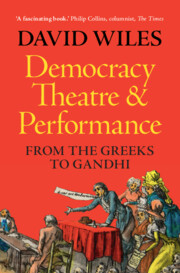Book contents
- Democracy, Theatre and Performance
- Democracy, Theatre and Performance
- Copyright page
- Contents
- Figures
- Acknowledgements
- Introduction
- Chapter 1 Rhetoric in Athens
- Chapter 2 Acting versus Sincerity
- Chapter 3 Puritan Democracy
- Chapter 4 Oratory in the French Revolution
- Chapter 5 American Democracy
- Chapter 6 Democracy as a Universal Good
- Chapter 7 Theatre and Theatrocracy in Democratic Athens
- Notes
- References
- Index
Chapter 7 - Theatre and Theatrocracy in Democratic Athens
Published online by Cambridge University Press: 17 May 2024
- Democracy, Theatre and Performance
- Democracy, Theatre and Performance
- Copyright page
- Contents
- Figures
- Acknowledgements
- Introduction
- Chapter 1 Rhetoric in Athens
- Chapter 2 Acting versus Sincerity
- Chapter 3 Puritan Democracy
- Chapter 4 Oratory in the French Revolution
- Chapter 5 American Democracy
- Chapter 6 Democracy as a Universal Good
- Chapter 7 Theatre and Theatrocracy in Democratic Athens
- Notes
- References
- Index
Summary
This chapter turns from democracy as theatre to the question of theatre’s place within a democracy. Modern political theatre foregrounds playwrights, understood to be people capable of enlightening the audience through their truthful representation of the world. Euripides’ Trojan Women has typically been read as an exposé of political wrongdoing, and an invitation to empathise with the suffering of the protagonists. In Athens, these plays were ’political’ in that they helped spectators unpick rhetorical strategies (Aristotle’s term is dianoia), making them discriminating judges in the law-courts and Assembly. Tragedies were part of a competition where audiences learned to judge the performance skills of writers and actors. Aristophanes’ Frogs is a case study in how decisions were actually made. Plato thought it unacceptable that aesthetic judgements could be based on crowd responses. He coined the term theatrocracy to evoke the power of the crowd to make aesthetic judgements, which he thought should remain the preserve of an educated elite. He saw the rule of the people in the theatre as both a metaphor for democracy and an instance of democracy in action.
Keywords
- Type
- Chapter
- Information
- Democracy, Theatre and PerformanceFrom the Greeks to Gandhi, pp. 169 - 183Publisher: Cambridge University PressPrint publication year: 2024

